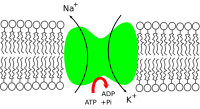
Potassium is the main intracellular ion for all types of cells, while having a major role in maintenance of fluid and electrolyte balance.[1][2] Potassium is necessary for the function of all living cells and is thus present in all plant and animal tissues. It is found in especially high concentrations within plant cells, and in a mixed diet, it is most highly concentrated in fruits. The high concentration of potassium in plants, associated with comparatively very low amounts of sodium there, historically resulted in potassium first being isolated from the ashes of plants (potash), which in turn gave the element its modern name. The high concentration of potassium in plants means that heavy crop production rapidly depletes soils of potassium, and agricultural fertilizers consume 93% of the potassium chemical production of the modern world economy.
The functions of potassium and sodium in living organisms are quite different. Animals, in particular, employ sodium and potassium differentially to generate electrical potentials in animal cells, especially in nervous tissue. Potassium depletion in animals, including humans, results in various neurological dysfunctions. Characteristic concentrations of potassium in model organisms are: 30–300 mM in E. coli, 300 mM in budding yeast, 100 mM in mammalian cell and 4 mM in blood plasma.[3]
- ^ Pohl, Hanna R.; Wheeler, John S.; Murray, H. Edward (2013). "Chapter 2. Sodium and Potassium in Health and Disease". In Astrid Sigel, Helmut Sigel and Roland K. O. Sigel (ed.). Interrelations between Essential Metal Ions and Human Diseases. Metal Ions in Life Sciences. Vol. 13. Springer. pp. 29–47. doi:10.1007/978-94-007-7500-8_2. ISBN 978-94-007-7499-5. PMID 24470088.
- ^ Clausen, Michael Jakob Voldsgaard; Poulsen, Hanne (2013). "Sodium/Potassium Homeostasis in the Cell". In Banci, Lucia (ed.). Metallomics and the Cell. Metal Ions in Life Sciences. Vol. 12. Springer. pp. 41–67. doi:10.1007/978-94-007-5561-1_3. ISBN 978-94-007-5560-4. PMID 23595670. electronic-book ISBN 978-94-007-5561-1 ISSN 1559-0836 electronic-ISSN 1868-0402.
- ^ Milo, Ron; Philips, Rob. "Cell Biology by the Numbers: What are the concentrations of different ions in cells?". book.bionumbers.org. Archived from the original on 20 April 2017. Retrieved 23 March 2017.
